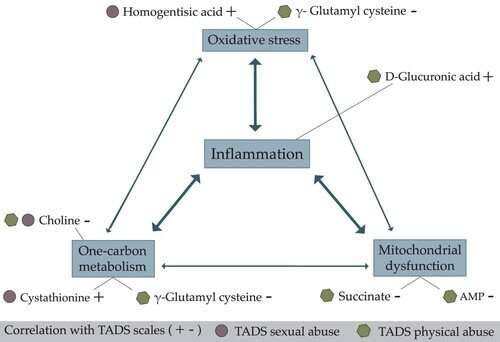This article has been reviewed according to Science X's editorial process and policies. Editors have highlighted the following attributes while ensuring the content's credibility:
fact-checked
trusted source
proofread
Pilot study finds metabolic alterations related to sexual and physical abuse

A pilot study conducted at the University of Eastern Finland found metabolites related to oxidative stress and the transsulfuration pathway of one-carbon metabolism to be associated with a history of sexual or physical abuse in depressed adolescent outpatients. Oxidative stress and transsulfuration are closely connected and regulate each other's functions, and they play a role in inflammation, which is also recognized as a possible mechanism of trauma.
The results were published in the journal European Journal of Psychotraumatology in a special issue entitled "Biological mechanisms underlying adverse mental health outcomes after trauma."
"Although the results are clearly preliminary and require further confirmation, the extent of similar findings in the literature related to the biological effects of trauma is convincing. Oxidative stress and the inflammatory system have often been associated with post-traumatic stress. Oxidative stress refers to an excess of unstable oxygen-containing molecules, which damage cells and have numerous consequences, whereas the end product of transsulfuration is an antioxidant compensating for this damage," says Doctoral Researcher Karoliina Kurkinen from the University of Eastern Finland.
The study included 76 depressed adolescent outpatients, whose blood samples were analyzed with mass spectrometry to determine the concentrations of specific metabolites. In addition to metabolites taking part in oxidative stress and transsulfuration, metabolites related to the methionine cycle of one-carbon metabolism, mitochondrial dysfunction and inflammation were also found to be associated with a history of abuse in these patients. These associations became smaller after taking into account depression and lifestyle-related background variables.
This exploratory pilot study should be replicated with a larger data set comprising post-traumatic stress disorder patients and healthy controls. In addition, future research could examine the levels of hypothalamic–pituitary–adrenal axis hormones and interleukins to take stress and inflammation better into consideration.
"Depression is a very common symptom in traumatized patients, but so are fight and flight-related symptoms, which relate to stress and activation of the sympathetic nervous system. It would be interesting to further investigate the biological mechanisms behind these two different symptom clusters, how they overlap and affect each other, and which pathways would be most helpful to intervene in for a traumatized patient," Kurkinen says.
More information: Karoliina Kurkinen et al, The associations between metabolic profiles and sexual and physical abuse in depressed adolescent psychiatric outpatients: an exploratory pilot study, European Journal of Psychotraumatology (2023). DOI: 10.1080/20008066.2023.2191396

















